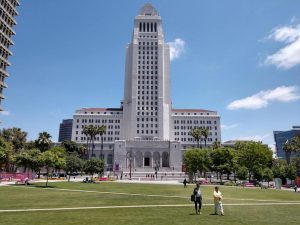LA County Declares State of Emergency over Monkeypox

On August 2nd, Los Angeles County declared a state of emergency in response to the outbreak of Monkeypox. It came a day after Governor Newsome declared a state of emergency for California.
California currently has over 1900 confirmed cases of the virus, with nearly 700 in LA alone.
Officials called a state of emergency to receive quicker access to resources to slow the spread of the virus.
However, it is a much different situation than COVID,
What is MonkeyPox?
Monkeypox is a rare disease that originates in Central and West Africa. While it usually affects animals, humans can still get it from skin-to-skin contact with an animal or human with the virus.
The virus has an incubation period of 5 to 21 days with symptoms lasting 2 to 4 weeks.
Per the CDC, Monkeypox symptoms include:
- Fever
- Skin Rash
- Headache
- Muscle Aches and Back Aches
- Chills
- Tiredness
- Swollen Lymph Nodes
For decades, the virus has been endemic in parts of Africa, with the US experiencing its last outbreak in 2003.
Vaccines and Treatments
Currently, two vaccines are available to prevent the spread of monkeypox: JYNNEOS and ACAM2000.
The former is the only one that is FDA approved for monkeypox, with the latter preventing the closely related disease smallpox. It is the primary vaccine being used.
As of right now, the vaccine is very limited, which is why LA County, the State of California, and the United States have called a state of emergency.
What does a State of Emergency Mean?
A state of emergency is the declaration from a government that a crisis is happening in your region (state, city, country). It allows the government to utilize resources quicker to combat whatever challenge is at hand.
When Governor Newsom called a state of emergency in October 2021 to deal with the state’s drought, it allowed them to put in a more comprehensive water-saving plan.
For monkeypox, the state hopes to stop the spread by utilizing some of the strategies that worked during the COVID-19 pandemic. Though we are unlikely to see a lockdown or other wide-reaching restrictions from this state of emergency.
It allocates resources to provide vaccination clinics to innoculate the most vulnerable and enables Emergency Medical Services (EMS) to administer vaccines.
In addition, it expands testing and contact tracing to slow the spread of the virus.
According to the Georgia Public Health Department, the best ways to avoid contracting monkeypox are:
- Avoid close skin-to-skin contact with people who have a rash that looks like monkeypox.
- Do not touch the rash or scabs of a person with monkeypox.
- Do not kiss, hug, cuddle or have sex with someone with monkeypox.
- Do not kiss, hug, cuddle or have sex with someone with monkeypox.
- Avoid contact with objects and materials that a person with monkeypox has used.
- Do not share eating utensils or cups with a person with monkeypox.
- Do not handle or touch the bedding, towels, or clothing of a person with monkeypox.
- Wash your hands often with soap and water or use an alcohol-based hand sanitizer, especially before eating or touching your face and after you use the bathroom.
While it is highly doubtful that monkeypox will affect society in the same way as COVID has, stay up to date with Boma on the Frontline for the latest on the outbreak.

